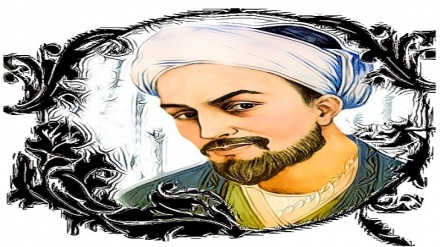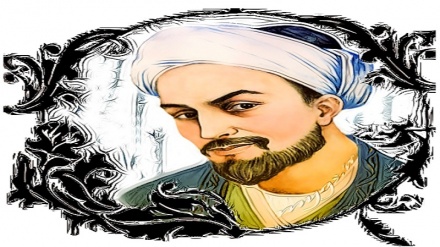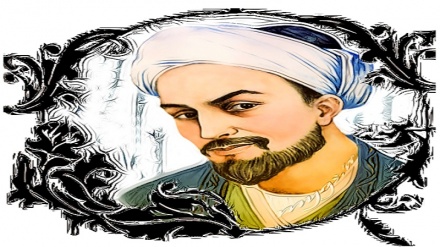Iranian notables, sources of global honor (205)
If you remember, for a couple of weeks we have been discussing the life and works of the famous poet of 6th and 7th century AH (12th and 13th century AD), Owhad-eddin Hamed ibn Abi-l-Fakhr Kermani. We said there is little information on the life and times of Owhad-eddin Kermani as chroniclers and biographers have written very little about him. The only sources for knowing him are the account of Mohye-ddin al-Arabi in Futuhat Makkieh and the book “Manāqeb” whose author is not known.
We also said that he had left Kerman due to the onslaught of Ghaz Turks and their dominance on the region. Researchers maintain that he was born in Zil-Hijja of 561 AH and died in Sha’ban of 635 AH in Baghdad. In the beginning of his trip he had gone to Baghdad and studied there and became the teacher of Hakkakieh school there.
Owhad-eddin Kermani didn’t believe Sufi Sheikhs; hence he spent most of his time in seclusion living as an ascetic to expurgate his spirit and heart. One day he passed by the Khanqah of Rokn-oddin Mohammad Sojāsi, a renowned Sufi of those days. Sojāsi was from Sojās village near Zanjan in Northwest of Iran. His Khanqah was beside River Tigris.
Owhad-eddin was appointed by the Abbasid caliph as the master of Sheikhs in Baghdad and stayed there till the end of his life.
As it was said before, Owhad-eddin Hamed ibn Abi-l-Fakhr Kermani was affected by Ibn Arabi. Mohye—ddin Ibn Arabi was an Arab Philosopher, Sufi and Poet from Andalusia. He entered Sufism at the age of 21. But soon he catapulted to fame to the extent that great Sufis the era would rush to visit him. Ibn Arabi authored many works. But his top books are Futuhat Makkiyeh and Fusus- ol-Hikam. The latter has been translated as “Bezels of Wisdom”. According to Dr. Mohsen Jahangiri, Islamic Irfan (Gnosticism), prior to Ibn Arabi was mainly practical and focused on austerity and inattention to the worldly affairs. But, Ibn Arabi’s Gnosticism is concentrates on love and affection. He believed in the Unity of Existence. Of course, this topic has been mentioned in the works of his predecessors like Abu Saeed Ab-ol-Kheir and Mansur Hallaj, too. The Gnostic views of Ibn Arabi have found their way into the Farsi literature by others. Many researchers maintain that Fakhr-uddin Eraqi was the first poet of the Farsi language who had been impacted by Ibn Arabi through Sadr-uddin Qunavi. However, evidence shows that he had not visited Ibn Arabi personally. To find the source of Ibn Arabi’s thoughts in the Farsi literature, we should go to his contemporaries. Owhad-eddin Kermani was the nearest person to him in terms of time. According to the book Manaqeb, Owhad-eddin had very close relationship with Ibn Arabi in the cities of Konia, Cairo and Damascus. This relationship was so close that Ibn Arabi had put his step-child, Sadr-uddin Qunavi under the care of Owhad-eddin. Moreover, Ibn Arabi has mentioned the name of Owhad-eddin in Futuhat Makkieh and narrated different hadiths from him.
If you remember, we had said that Owhad-eddin Kermani believed in veneration and worship of beauty. His thoughts also show a kind of unity of existence. He was among those mystics who tried to make a bond with the phenomena in the outer world. These mystics used to pursue their students to contemplate in natural phenomena to find a way to cognizance of God. German scholar, Shudder said, “The idea of the Perfect Man continued its way till the 6th century AH with a tinge of Sufism and Shia thought. It culminated in the views of Ibn Arabi and through him spread to the literature of the Islamic nations. Owhad-eddin Kermani, Fakhr-eddin Eraqi and later on Sheikh Mahmud Shabestari promoted the idea of the Perfect Man in the farsi literature. The Perfect Man shaped the core of Ibn Arabi’s ideology.”
Like Ibn Arabi, Owhad-eddin Kermani believed in the two worlds, namely, the inner world and the outer world. Thus, in many of his quatrains he tries to prove the issue that the words being used have connotations beyond their apparent meaning. He says:
در دایرۀ وجود موجود تویی مقصود نگویمت که معبود تویی
In the whole existence, the sole Being is You,
Not just the purpose, but the worshipped is You.
گر در غزلی نام خط و زلف برم می دان که بهانه است، مقصود تویی
If eyebrow and hair are mentioned in a lyric,
Do know, it’s an excuse; the purpose is You.
Ibn Arabi believed that the objects are the manifestation of God. Elsewhere, Owhad-eddin Kermani says:
پیدا و نهان و شادی و غم همه اوست بنیاد وجود، سست و محکم همه اوست
Every seen, unseen, joy and sorrow is in His hand,
Creation, weak or strong, appears by His command.
خواهی که چو خورشید ببینی او را دربند زخود دیده و عالم همه اوست
If you wish to behold Him like the sun,
Close eyes, as in the whole world He is found.
In view of Owhad-eddin Kermani the greatest glorification of God is to see him in the entire creation.
RM/ME


